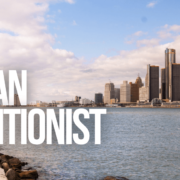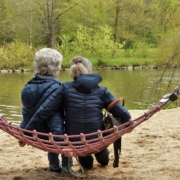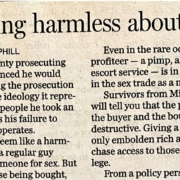
Currently, 49 out of the 50 US States fully criminalize commercial sex buying and selling, meaning that both the prostituted individuals and the person buying, if caught, would face charges.
There is one point that we agree on with the full decriminalization legislation, and that is that we believe the person who is selling sex (that we at MAP would refer to as a prostituted individual) should NOT be criminalized.
For those in favor of full decriminalization, they would also add to it that they do not believe the person purchasing sex should be criminalized either. That both selling and buying sex should be legal.
If you missed the conference, we highly recommend that you register to receive the link to watch the sessions! CLICK HERE
So, why did we choose to focus on this for our conference this year?
It began in Washtenaw County, on the East side of Michigan. The current prosecutor, Eli Savit, issued a policy that stated he would not prosecute consensual commercial sex. This view is highly problematic because sex buyers will not be held accountable for the harm they inflict.
Eli’s policy began an outcry from the anti-human trafficking community, from our communities to #stopsavit. Many advocates and organizations joined alongside survivors as they met with Eli to help him understand how his policy will negatively affect addressing trafficking in his county. They urged him, to listen to the voices of the people who were exploited under the guise of “prostitution or consensual commercial sex.”, and to help him understand that his policy will increase the demand for commercial sex and therefore, increase exploitation. There are not enough willing women and men to fill the demand, so it must be filled somehow. And the how is trafficking.
Please join us at equalitymodelmichigan.com to stay informed and updated about ways you can get involved in Michigan.
And so, we were left with the question, “How can we help?”
If you have followed with us for any length of time hopefully you know that the main focus of MAP is EDUCATION. So, we set out to do just that. Educate. Enter the Empower Conference 2021 with a focus on the Equality Model. We set out to help educate the public on the harms inflicted by sex buyers, the various legislative models, what is being done/has been done in other states, what survivors are saying about it all, what is being done in Michigan in response to human trafficking, and lastly, what we can all do together about it.
The lineup of speakers was STACKED. And we don’t say that to toot our own horn…these men and women are EXPERTS, we are deeply grateful to them for saying yes to this conference. Six of them are Survivor Leaders and have lived experience of being in the commercial sex trade and two of them are Attorneys who are leading the way in Equality Model legislation. We could have easily listened to them talk all day. They informed us with facts, deep conviction, and passion.
Melanie Thompson kicked the conference off by giving an explanation of the legislative frameworks within the sex industry: full criminalization, partial decriminalization or the Equality Model, legalization, and full decriminalization. Another part of her presentation that impacted many who attended was her piece on the importance of language and terminology when we refer to “sex work.” She was incredible and explained the legislative jargon in ways the general public could understand.
Session Two involved a deeper look at the legislative actions that have happened or are in process in different states. We heard from Nate Walsh a Human Trafficking Attorney in Maine who has helped lead the Equality Model bill that is set to be voted on soon, Yasmin Vafa also an Attorney and works with Rights4Girls in Washington D.C and has been very involved in legislation there, Brittany Pearson a Survivor Leader and Human Trafficking consultant who has been involved in the recent vetoed vote to decriminalize sex buying in Louisiana and Melanie Thompson moderated the conversation as well as gave her thoughts as someone involved with legislation for the Equality Model in New York. At the end of their time, they gave advice to us Michiganders on what we can be doing, how we can be learning and educating, petitioning our local governments, and also helping support these other states in the work they are doing.
Session Three hit to the heart of why we put this conference on, Survivor’s Voices. One of the biggest problems with the Full Decriminalization of prostitution is that the voices of those who have been exploited and abused by the sex trade are further silenced. We heard from Survivor Leaders Bekah Charleston, Cristian Eduardo, Alice Jay, and Alisa Bernard. One of the questions posed was “What does choice look like in sex work?” This being one of the main positions held by the Full Decrim side, that sex workers have a choice in who they sell to, and what they do with their bodies. Alisa responded, “We call it a ‘trick’ for a reason.” And Cristian laughed and very clearly stated, “It is a joke…the reality is there isn’t a choice.” We, and others who attended, wished we could have had more time to hear their impassioned call to recognize the reality of fully decriminalizing the sex trade. Bekah Charleston had a unique perspective as she was involved in a place where commercial sex was legal, Nevada. She gave insight into what it actually is like to experience legal prostitution.
Session Four was led by Michigan’s very own Alice Jay! We were so honored to have her share about the work she is doing with Neighborhood Legal Services to help women and girls exit the sex trade. They work with the 36th District Court in Wayne County, along with many other support services, to help survivors heal and set them up for future success. We were encouraged by how she ended, telling us in an empowered voice “Recovery DOES happen, it IS possible!” We love you Alice and are so encouraged by the work you are doing. We hope we will see more of this across the state!
We ended the conference with a Call to Action…how can we take what we learned and do something about it? For those of you who attended, we hope this was educational and helpful in your own journeys to understanding the complexities of the sex trade and how legislation plays into it. We want to continue to encourage you to listen to the voices of survivors. To learn about all of the legislative frameworks and think critically about how this impacts our most vulnerable fellow humans.
We welcome the continued conversation! Spread the news and dialogue. If legalizing sex work legislation is not in your state or county yet, it will be. Become an informed citizen, stand as an ally to Survivors, and join with all of us to DO something about it!
Take action by viewing our google drive and utilizing some of the resources. Write to your legislators, to the prosecutors in your county, and help them understand why The Equality Model, or partial decriminalization, is so important. Share on social media and help inform those in your sphere of influence. Invite others to register for the conference so they can view the sessions. (click here!)







 Image by
Image by 
